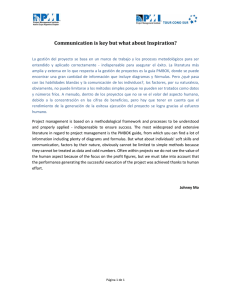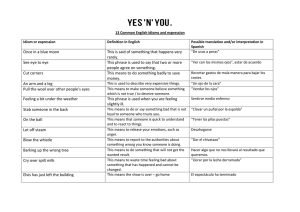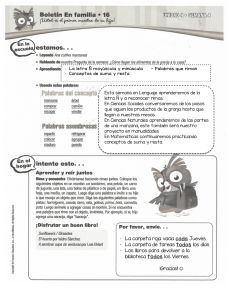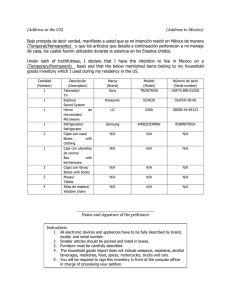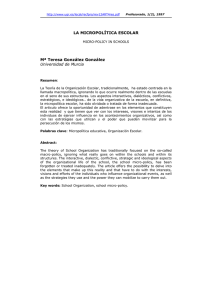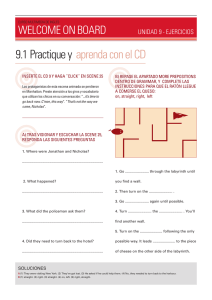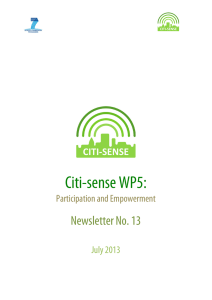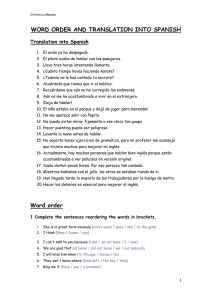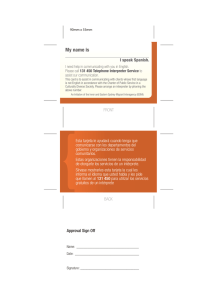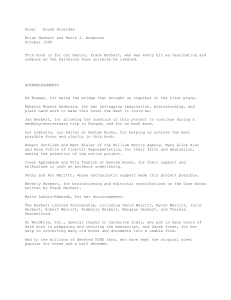PhD Thesis Title Collaborative Systems Engineering
Anuncio
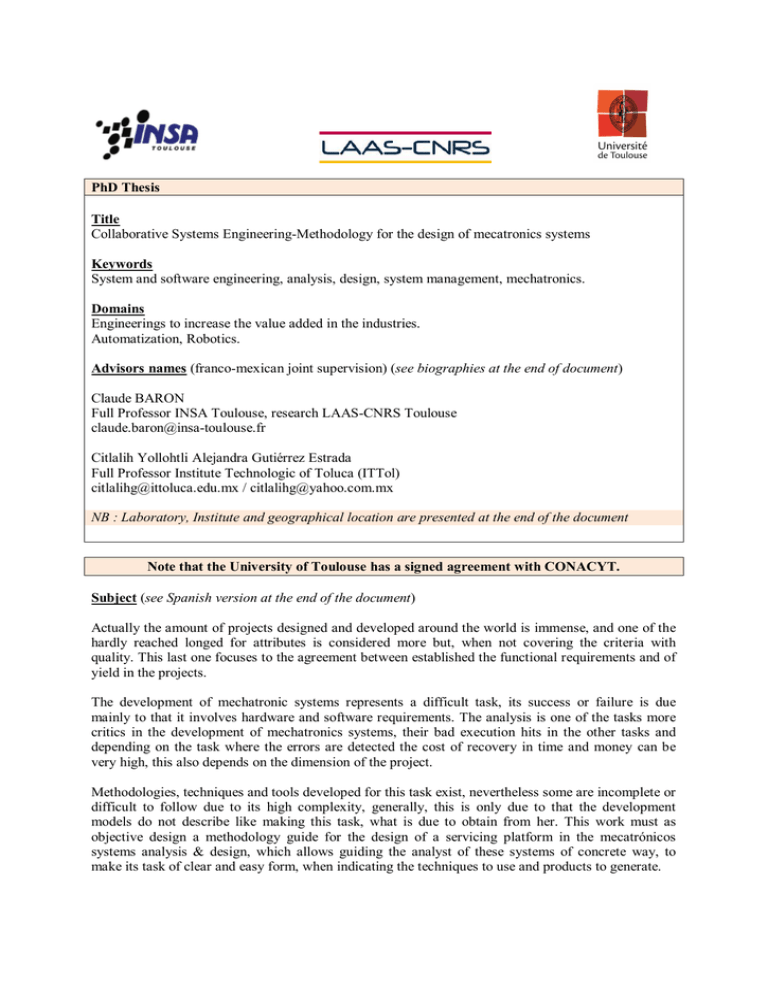
PhD Thesis Title Collaborative Systems Engineering-Methodology for the design of mecatronics systems Keywords System and software engineering, analysis, design, system management, mechatronics. Domains Engineerings to increase the value added in the industries. Automatization, Robotics. Advisors names (franco-mexican joint supervision) (see biographies at the end of document) Claude BARON Full Professor INSA Toulouse, research LAAS-CNRS Toulouse claude.baron@insa-toulouse.fr Citlalih Yollohtli Alejandra Gutiérrez Estrada Full Professor Institute Technologic of Toluca (ITTol) citlalihg@ittoluca.edu.mx / citlalihg@yahoo.com.mx NB : Laboratory, Institute and geographical location are presented at the end of the document Note that the University of Toulouse has a signed agreement with CONACYT. Subject (see Spanish version at the end of the document) Actually the amount of projects designed and developed around the world is immense, and one of the hardly reached longed for attributes is considered more but, when not covering the criteria with quality. This last one focuses to the agreement between established the functional requirements and of yield in the projects. The development of mechatronic systems represents a difficult task, its success or failure is due mainly to that it involves hardware and software requirements. The analysis is one of the tasks more critics in the development of mechatronics systems, their bad execution hits in the other tasks and depending on the task where the errors are detected the cost of recovery in time and money can be very high, this also depends on the dimension of the project. Methodologies, techniques and tools developed for this task exist, nevertheless some are incomplete or difficult to follow due to its high complexity, generally, this is only due to that the development models do not describe like making this task, what is due to obtain from her. This work must as objective design a methodology guide for the design of a servicing platform in the mecatrónicos systems analysis & design, which allows guiding the analyst of these systems of concrete way, to make its task of clear and easy form, when indicating the techniques to use and products to generate. Its formalization is based on the recommendations that the Engineering of Systems governs (ES), when applying Traditional Methodologies like the incremental evolutionary cascade and (to give pursuit to the model of service life of products to generate) and agile methodologies, like Scrum and Kanban (for the Management of the Projects, MP). The model that is obtained from the methodology will be validated in practical form; the first results will be obtained applying the methodology in two mechatronics projects. The expected results are focused on: 1. The elaboration of a methodological guide that allows to integrate the recommendations of the systems engineering and the project management that are based on the Engineering of the Collaboration, doing use of techniques of the Engineering of Requirements and the analysis of the business processes. 2. The validation of the methodology that will be realized with two mecatrónicos systems, developed by two interdisciplinary and multidisciplinary groups of collaboration, laboratory LAAS of Toulouse, France and the Robotics and Engineering of Systems laboratory of the Technological Institute of Toluca, Mexico. 3. Problems of non cooperation between technical engineers and project managers, and of the need for laying out to methodological guide that it integrates methods and tools to supervises and control the advance of the projects overall, and to share the decisions. The Mexican and French laboratories will be responsible for the exchanges and the implementation of the PhD formation, as well as of the application of their knowledge on two real study cases with the objective to testing and validate the methodology. Thus, the results got on preliminary cases of studies could be confronted with these experiments. Planning The following diagram shows the distribution of each activity to be carried out during the studies of doctorate, it should be looked at that the activities will start from 2015 and finish in 2019. Research work will begin with a state of art study on processes, data and methods relative to the subject, and finish with the writing of the memory. The PhD student will be integrated to a project team (researchers, industrial managers, PhD students) which aims to define and realize a software prototype to support decision making for project management in the context of system engineering projects. Prerequisite Good level of (spoken, read and written) English Knowledge or notions on Engineering of systems and project management Programming skills in different platforms Minimum average of 8,0 or equivalent. No French level is required, whether some basic notions of French will be appreciated. Scientific Collaboration between foreign Universities The Collaboration between the two institutions started in 2003, more than 11 years ago. It started with the master's studies of Mrs. Citlalih Gutiérrez, directed by Mrs. Claude Baron. It continued during three years of doctorate of Mrs. Gutiérrez in France. Many publications, in international conferences, in reviews, as well as a chapter in a book, were published during the thesis. Collaboration continued still after the return of Mrs. Gutiérrez to Mexico and was concretized by new publications. This ways, thesis of master degree of Angelica Millán Díaz, with the subject "Determinación de Requerimientos Funcionales utilizando Representaciones Semánticas", submitted on January 2011 and done in the Technological Institute of Toluca (Mexico), was supervised by Mrs. Citlalih Gutierrez and Mrs. Claude Baron (co-advisor). The evoked scientific production is specified below. Publications of Mexican team: · · · · · · C. Baron, D. Estève, C. Gutierrez, "Introduction of evolutionary computation into a shared process: product design and project management", FUture BUsiness TEchnology Conference (FUBUTEC), pp. 28-33, Fontainebleau, France, Mars 2004. S. Rochet, J-C. Hamon, C. Gutierrez, C. Baron, D. Estève, "Vers une démarche de conception cohérente Proposition d’une méthode et d’outils pour la gestion des alternatives de conception", 6e Congrès International. de Génie Industriel, Besançon, France, Juin 2005. C. Baron, S. Rochet, C. Gutierrez, "Proposition of a Methodology for the Management of Innovative Design Projects", 15th Annual INternational COnference on System Engineering (INCOSE), Rochester, NY USA, Juillet 2005. A-M. Alquier, M-H. Tignol, C. Baron, C. Gutierrez, "Pour une vision intégrée du système d'information et de la gestion de projet", Integrated Design and Production Conference, Casablanca, Maroc, Hermès Science Publications, Novembre 2005. C. Gutierrez, C. Baron, L. Geneste, P. Clermont, D. Estève, S. Rochet, “How to interconnect Product Design and Project Management including Experience Feedback and Reusability requirements", IEEE International Conference on Information Reuse and Integration, pp. 294-299, Août 2005, Las Vegas, USA. C. Gutierrez, C. Baron, D. Estève, "Design and project management : their coordination on a platform of interoperable tools", Information Control problems in Manufacturing Conference (INCOM), Elsevier Science, Saint-Etienne, France, mai 2006. Publications of French team: · · · · · Claude BARON, Rachid CHELOUAH, Marc Zholghadri and Citlalih GUTIERREZ. “Optimizing system design by the use of adapted heuristics”. Editing book on Foundation in Computational Intelligence. To be published by Series "Studies in Computational Intelligence" published by Springer Verlag, 2008. S. ROCHET, C. BARON, H. MALGOUYRES, D. ESTEVE, "Proposition of a formal frame to facilitate the application of processes in system engineering", 18th Annual International INCOSE Symposium Utrecht, Nederland (June 2008). M. Zolghadri, C. Baron, P. Girard. "Innovative product and Value network co-design: context, problematic and some exploratory results", special issue of CERA on Collaborative Product Development, International Journal of Concurrent Engineering, 2007. G. AURIOL, C. BARON, J-Y. FOURNIOLS “Teaching requirements skills within the context of a physical engineering project”. The Third International Workshop on Requirements Engineering Education and Training (REET'08), September 9th, 2008, Barcelona, Spain. C. BARON, R. CHELOUAH, "Ant Colonies algorithm hybridized with tabu and greedy searches applied to multiobjective optimization in project management", Journal of Meta-heuristics 1381-1231 print 1572-9397 oneline (September 2007). Advisors Biographies Claude BARON is full professor in computer sciences at the National Institute of Applied Sciences (INSA) of the University of Toulouse (France). She teaches systems engineering, system design and modelling, and system reliability for real time and critical embedded software systems in master programs. She also is in charge of International Cooperation at the master level for INSA Toulouse. Her current research is focusing on systems engineering, collaborative engineering and project management in engineering projects. She develops her research activities in the LAAS-CNRS laboratory in Toulouse. She is the author of many international articles, (co)authored several books and received several awards for her results. See http://gei.insa-toulouse.fr/fr/departement/people/claude-baron.html Citlalih Gutiérrez Estrada, made a Ph.D in the Microelectronic with the speciality in Design of Circuits and Microsystems, in Toulouse France in 2004, a Master degree in Computer sciences in 2000 with the speciality in Pattern Recognition. She is full professor in mechatronics at the Technological Institute of Toluca (Mexico). She teaches systems engineering, system design and modelling, and research methodology. Her current research is focusing on systems engineering, collaborative engineering and project management in engineering projects. She is the author of many international articles. Contact : citlalihg@ittoluca.edu.mx citlalihg@yahoo.com.mx Laboratory LAAS details The Laboratory of Analysis and Architecture of Systems (LAAS, http:// http://www.laas.fr/) is a CNRS research unit associated with the University of Toulouse. LAAS’ research activities fall within the domain of Information Sciences and Technologies and address complex systems at different scales, to devise theories, methodologies and tools for modeling, designing and controlling them. Research, innovation and transfer are tied. The lab has a history of strong relationships with industry and works in a large number of collaborative projects with international, national and regional industries of all size. The systems considered in our research are of different kinds: integrated systems, embedded systems with real time and safety requirements, distributed systems, mobile systems, autonomous and robotics systems, micro and nano systems, biological systems. They fall in various application domains such as aeronautics and space, telecommunications, transports, production, services, security and defense, energy management, healthcare, environment and sustainable development. How to access to the lab: The LAAS is ideally located near the subway (2’ by walking), thus 5’ from the Toulouse city centre is easily reachable. You can also ride a cycle on the Canal du Midi of take the bus. INSA and LAAS provide accommodations and meals on the campus. INSA details INSA : http://www.insa-toulouse.fr With eleven thousand alumni present in all economic sectors, the Institut National des Sciences Appliquées of Toulouse, an international, pluridisciplinary, state engineering school, is recognised for the excellence of its five-year education which attracts students of a high academic level and who have obtained excellent results at the Baccalaureat. INSA Toulouse is situated on the campus of Rangueil in a pleasant environment. A wide variety of cultural activities, clubs and sports facilities are available to students and staff. Toulouse City - Overview The capital of the Midi-Pyrenees region in southwest France, Toulouse, the ‘Pink City' (thus named because of the colour of the brick many of its buildings are made of), is a city at the crossroad between tradition and modernity. Today this modern city counts almost 500,000 inhabitants and is driven by its leading aeronautical industry and ‘sky tourism' (the Cité de l'Espace http://www.cite-espace.com/ is one of Toulouse's most popular attractions). Toulouse has a big student population (the second in France after Paris), and this means it is a youthful, energetic city with a vibrant nightlife. Toulouse is famous for its aeronautical and space achievements, its university founded in 1229, its laboratories and research centres. Toulouse is also a green city to live in, with many parks, gardens and squares in which to enjoy its warm Mediterranean sunshine (over 2,000 hours a year on average). Going for a stroll along the River Garonne, or for a cycle along the Canal du Midi maybe, are great ways to spend an afternoon before tucking into some of the hearty local cuisine. Subject (Spanish version) Actualmente la cantidad de proyectos diseñados y desarrollados alrededor del mundo es inmensa, y se considera uno de los atributos más añorados pero difícilmente alcanzados, al no cubrir los criterios de calidad. Esta última se enfoca a la concordancia entre los requisitos funcionales y de rendimiento establecidos en los proyectos. El desarrollo de sistemas mecatrónicos representa una tarea difícil, su éxito o fracaso se debe principalmente a que involucra requisitos de software y de hardware. El análisis es una de las tareas más críticas en el desarrollo de sistemas mecatrónicos, su mala ejecución impacta en las demás tareas y dependiendo de la tarea donde se detecten los errores el costo de recuperación en tiempo y dinero puede ser muy alto, esto también depende de la dimensión del proyecto. Existen metodologías, técnicas y herramientas desarrolladas para esta tarea, sin embargo algunas son incompletas o difíciles de seguir debido a su alta complejidad, en general, esto se debe a que los modelos de desarrollo no describen como hacer esta tarea, sólo lo que se debe obtener de ella. Este trabajo tiene como objetivo diseñar una guía metodológica para el diseño de una plataforma de trabajo en el análisis y diseño de sistemas mecatrónicos, que permita guiar al analista de estos sistemas de manera concreta, para hacer su tarea de forma clara y fácil, al indicarle las técnicas a utilizar y los productos a generar. Su formalización se basa en las recomendaciones que rige la Ingeniería de Sistemas (IS), al aplicar Metodologías Tradicionales como la cascada y evolutiva incremental (para dar seguimiento al modelo de ciclo de vida de los productos a generar) y Metodologías Ágiles, como Scrum y Kanban (para la Gestión de los Proyectos, GP). El modelo que se obtenga de la metodología será validado de forma práctica y los primeros resultados serán obtenidos aplicando la metodología en dos proyectos mecatrónicos. Los resultados esperados se enfocan a: 1. La elaboración de una guía metodológica que permita integrar las recomendaciones de la IS y GP que se basan en la Ingeniería de la Colaboración, haciendo uso de técnicas de la Ingeniería de Requisitos y el análisis de los procesos de negocio. 2. La validación de la metodología que será realizada con dos sistemas mecatrónicos, desarrollados por dos grupos de colaboración interdisciplinarios y multidisciplinarios, el laboratorio LAAS de Toulouse, Francia y el laboratorio de Robótica e Ingeniería de Sistemas del Instituto Tecnológico de Toluca de México. 3. Problemas por la falta de cooperación entre ingenieros técnicos y administradores del proyecto, y la necesidad de trazar una guía metodológica que integre métodos y herramientas para supervisar y controlar el avance general de los proyectos e intercambiar las decisiones.
